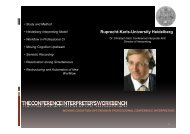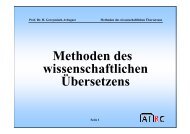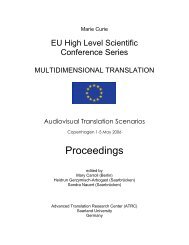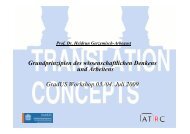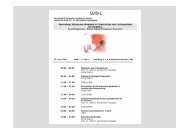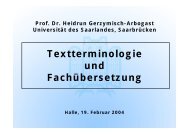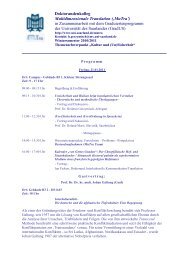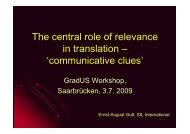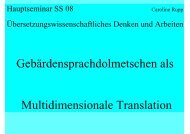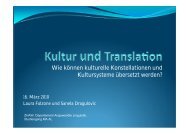Proceedings - Translation Concepts
Proceedings - Translation Concepts
Proceedings - Translation Concepts
You also want an ePaper? Increase the reach of your titles
YUMPU automatically turns print PDFs into web optimized ePapers that Google loves.
MuTra 2005 – Challenges of Multidimensional <strong>Translation</strong>: Conference <strong>Proceedings</strong><br />
Gertrud Hofer<br />
3.6 Reactions from the Supreme Court of the Canton of Zurich<br />
After the pilot courses, the Interpreting Group evaluated the results of the courses and exams.<br />
The primary reasons for unsatisfactory performance in the exams were a lack of specialized<br />
knowledge and a limited ability to interpret.<br />
What the Interpreting Group experienced in the exams:<br />
• a word-for-word translation is not the basis for good interpreting<br />
• language competence in two languages has to be high<br />
• interpreting demands analytical skills<br />
• preparation is a necessity<br />
• access to information (which may include records) is essential<br />
Measures<br />
In addition to the two evaluation measures described in 3.4 for the basic course exam, the<br />
Interpreting Group implemented a third criterion for inclusion in the register, so there are<br />
three possibilities for selection, before and after the basic course as well as parallel to it:<br />
• passing a high-level German exam (for which about 850 – 1300 teaching units are a<br />
prerequisite for non-native speakers of German)<br />
• passing the exam after the basic course<br />
• passing an interpreting test at the Center of Continuing Education (This additional<br />
criterion was introduced to test individual interpreters on demand if a judge complains<br />
about their performance.)<br />
The decision about inclusion or expulsion from the register is always with the Interpreting<br />
Group. One of the difficulties with expulsion concerns critical languages such as Urdu or<br />
Igbo; these have to be covered even if the respective interpreters are not successful in the<br />
exams.<br />
Initial consequences: Seminar for the commissioners<br />
Over the last two years interpreting has become an important issue on the political agenda in<br />
the Canton of Zurich. 9 Proof of the broader commitment by the Supreme Court of the Canton<br />
of Zurich is the institution of a so-called lunch and learn seminar on the topic for<br />
commissioners. In discussions with the members of the Interpreting Group, it became obvious<br />
that commissioners have diverse opinions about the strategies, tasks, and competence of<br />
interpreters. Yet the commissioners can contribute considerably to good performance on the<br />
part of court interpreters. The commissioners have to become aware that a successful strategy<br />
is not based on literal translation or interpreting: interpreters render meaning, not just words.<br />
The commissioners should also understand the various interpreting techniques and their<br />
appropriate application in trials, interrogations, or examinations. The demanding task of court<br />
interpreters can be eased if they are given time for preparation and access to records. Court<br />
interpreting (in all settings) can only succeed if interpreters truly understand what is said. Of<br />
course, prerequisite to this is sufficient competence with respect to special knowledge,<br />
language, and terminology, as discussed above. This competence is not static, however;<br />
interpreters must adapt continually to new situations in courts and offices and acquire new<br />
9 The President of the Supreme Court of the Canton of Zurich, Dr. R. Klopfer, confirmed the importance of court<br />
interpreting in an interview in the leading Swiss daily newspaper (NZZ 2005).<br />
170



